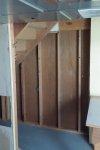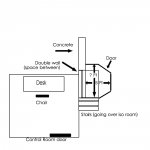Hi everyone,
I'm in the process of getting a little recording space going (that currently doubles as my office). On the other side of the right wall of my office (which is in the basement) is the staircase leading to the main level. Currently, there is a nice open area under the stairs roughly 3 1/4 feet from stud to stud and open after the top of the stairs. My plan is to build a space that will be at least 3 feet (I may build it out, but this would require putting it directly under an air duct which is already very low) by 5 or 6 feet.
I'm on a limited budget and I'm not looking to build a studio-grade sound proof room, but I am looking for a bit of isolation between my office/control room and the "isolation room." I plan to use standard 2X4s and standard drywall and to insulate the walls with Roxul Safe and Sound and then line the walls with some type of acoustic absorption material. I also plan to cut a window probably 24 X 36 inches. My question is about the glass. I can get standard glass panes at Lowes (I plan to do a double pane - one on each side of the wall). The price is attractive, but I'm not sure if I should consider buying thicker glass. I've researched and understand the "weak link" theory. Since my wall is not going to be super soundproof anyway, I don't want to waste money on great glass only to have my wall be the "weak link" but if it's worth buying more expensive glasses (if the window would be the "weak link" I can certainly spring for this. I'd love to hear your thoughts. Thanks!
Daniel

I'm in the process of getting a little recording space going (that currently doubles as my office). On the other side of the right wall of my office (which is in the basement) is the staircase leading to the main level. Currently, there is a nice open area under the stairs roughly 3 1/4 feet from stud to stud and open after the top of the stairs. My plan is to build a space that will be at least 3 feet (I may build it out, but this would require putting it directly under an air duct which is already very low) by 5 or 6 feet.
I'm on a limited budget and I'm not looking to build a studio-grade sound proof room, but I am looking for a bit of isolation between my office/control room and the "isolation room." I plan to use standard 2X4s and standard drywall and to insulate the walls with Roxul Safe and Sound and then line the walls with some type of acoustic absorption material. I also plan to cut a window probably 24 X 36 inches. My question is about the glass. I can get standard glass panes at Lowes (I plan to do a double pane - one on each side of the wall). The price is attractive, but I'm not sure if I should consider buying thicker glass. I've researched and understand the "weak link" theory. Since my wall is not going to be super soundproof anyway, I don't want to waste money on great glass only to have my wall be the "weak link" but if it's worth buying more expensive glasses (if the window would be the "weak link" I can certainly spring for this. I'd love to hear your thoughts. Thanks!
Daniel


 I realize sound will get through. I just want to minimize it wherever possible. I read about resilient channels helping with vibrational noise (foot steps, etc.) Would these also help with regular sound transmission? I'm really just looking for a barrier between the office/control room and the place I record vocals even if it's not a perfect one. Thanks again for all the suggestions!
I realize sound will get through. I just want to minimize it wherever possible. I read about resilient channels helping with vibrational noise (foot steps, etc.) Would these also help with regular sound transmission? I'm really just looking for a barrier between the office/control room and the place I record vocals even if it's not a perfect one. Thanks again for all the suggestions!

